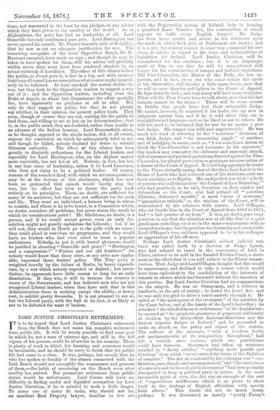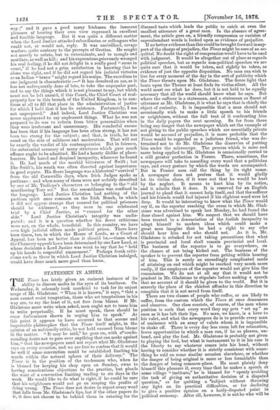LORD JUSTICE CHRISTIAN'S RETIREMENT.
IT is to be hoped that Lord Justice Christian's retirement from the Bench does not mean his complete retirement from public life. It will be surely possible to find some post in which he, not a man of extreme age, and still in the full vigour of his powers, could be of service to his country. There is plenty of work in which his learning and acuteness would be invaluable, and we should be sorry to think that his public life had come to a close. It was, perhaps, but seemly that he who has spoken so frankly of the abuses connected with the Irish Bench should not exemplify the commonest and grossest of them,—the habit of remaining on the Bench even after senility has arrived. But premature retirement from public duties would be unfortunate. Lord Cairns will have no difficulty in finding useful and dignified occupation for Lord Justice Christian, if he is minded to work a little longer. To name one of many fit tasks, why should not he, an excellent Real Property lawyer, familiar as few are with the Registration system of Ireland, help in framing a practical Land Transfer Act, the construction of which appears to baffle every English lawyer? No Judge has been more caustic and severe in his strictures upon the mode in which Irish Acts of Parliament are drawn ; and it is a pity the country cannot in some way command his ser- vices, or advice in regard to the form and technicalities of legislation for Ireland. Lord Justice Christian will be remembered for his erudition ; but it is no disparage- ment of him to say that he will be remembered still longer for his eccentricities of temper and judicial explosions. The Vice.Chancellor, the Master of the Rolls, the law re- porters, and in fact, every one who came within the circle of his observation, will breathe a little more freely, now that ho will no more thunder and lighten in the Court of Appeal. He lays down the lash ; and very many will have cause to rejoice. What will the Four Courts have to talk about, now that his last tornado cannot be the theme ? There will be some sorrow in Dublin that people have lost their untamable Judge. He cannot, however, be surprised if his faults rise up now in judgment against him, and if he is told what they are in straightforward language, such as he liked to use to others. He will not need to be informed that he was by no means a per- fect Judge. His temper was wild and ungovernable. He was much too fond of referring to the " notorious" decisions of one Irish Judge, and " the unmeaning juggle " of another, and of indulging in sneers, such as, " I am sometimes driven to think the Vice-Chancellor is not fortunate in his reporters." Our readers may remember the elaborate and unseemly attack, full of sarcasms and poetical quotations, directed against the Vice- Chancellor, for alleged perversion or grotesque misconception of a decree of the Court of Appeal. It is not long ago since he wrote to the Times, virtually saying that of the three Law Lords in the House of Lords who had reversed one of his decisions, only one knew anything as to Equity. His undignified war with " a body of persons who call theuiselves the Council of Law Reporting,' " who had practised, as he said, deception on their readers and defamation on the Court, who had palmed off " pointless illiterate, dislocated muddle," a mere " mess of nonsense," " ignominious rubbish," as the wisdom of the Court., will be remembered by his admirers with sorrow. Lord O'Hagan, who sat beside him in the Court of Appeal from 1869 to 1874, had " a bad quarter of an hour." It was, no doubt, pure exag- geration to say that the situation was at all like that of a quiet gentleman travelling vis-a-vis in the same compartment with an escaped madman ; but the position was harassing and unenviable. Lord O'Hagan's very mildness appeared to be to his colleague an aggravation of his offences.
Perhaps Lord Justice Christian's wildest judicial out- burst was called forth by a decision of Judge Lynch, who had refused to insert in the conveyance of land in Ulster, ordered to be sold in the Landed Estates Court, a state- ment to the effect that it was sold subiect to the Ulster tenant- custom. That Judge and Lord O'Hagan thought that this would be unnecessary, and declined to take a course which would have been equivalent to the annihilation of the interests of tenants in estates which had been sold without the insertion of this proviso. But Lord Justice Christian had no compunctions on the subject. He was an Orangeman, and a believer in landlords, as the salt of society ; he hated the Land Act., and he was only too glad to drive a coach-and-six through it. He railed at " the inadequacy of the treatment" of the question by the Court below, and at the hands of the Lord Chancellor ; he attacked " the blindfoldness or recklessness " of the Legislature ; he sneered at " the prophetic guarantee of perpetual uniformity of decision by the thirty-three Assistant-Barristers and the sixteen superior Judges of Ireland ;" and he proceeded to make an attack on the policy and object of the statute. The authors of the measure, " with a heedless levity not uncharacteristic of its composition throughout," had left a terrible cases masses, which any practitioner could have foreseen. Statesmen had taken up nonsense retailed in " flashy articles," " anything more puerile and frivolous" than which " never entered the brain of the flightiest of essayists." The Act as construed by his colleague was " con- fiscation, pure, simple, and uncompensated," and "the sacredness of contracts and the laws of political economy" had been probably disregarded to keep a political party in power. In the most favourable point of view, the Act was an example of the sort of "supercilious indifference which is so prone to show itself in the dealings of English officialism with merely Irish affairs." This tirade did not do much harm, perhaps. It was discounted as merely " pretty Fanny's way ;" and it gave a good many Irishmen the innocent pleasure of hearing their own view expressed in excellent and forcible language. But it was quite a different matter when the Lord Justice attacked subordinates or colleagues who could not, or would not, reply. It was uncivilised, savage warfare, quite contrary to the precepts of Grotius. He sought not merely to refute, but to exterminate, and to mangle and mutilate, as well as kill ; and his expressions grievously wronged his real feeling, if he did not delight in a really good "scene in court," if he had not a grim satisfaction in knowing that he alone was right, and if he did not regard his judicial victories as an Indian " brave " might regard his scalps. The exordium to one judgment is characteristic :—" It has devolved on me, as it has not unfrequently done of late, to take the unpopular part, and to say the things which it is not pleasant to say, but which must not be left unsaid, if this Court, the Chief Court of real- property law in this branch of the United Kingdom, is to con- tinue at all to fill that place in the administration of justice for which I hold that it has its existence. Fortunately, I am not unprepared." And indeed, Lord Justice Christian was never unprepared to say unpleasant things. What he was not prepared to do was to refrain from bitter personalities when they were irrelevant and unnecessary. His wonderful excuse has been that if his language has been often strong, it has not been too strong for the subject ; and that, in truth, he has erred on the side of mildness and moderation. That will not be exactly the verdict of his contemporaries. But in fairness, the substantial accuracy of many strictures which gave much offence ought to be admitted. He had a hearty dislike of place- hunters. He hated and despised incapacity, wherever he found it. He had much of the morbid bitterness of Swift ; but like Swift's, his wrath was often directed against impostures in good repute. His fierce language was a historical " survival " from the old Cornwallis days, when Irish Judges spoke as partisans ; and when many of them were not unfairly described by one of Mr. Trollope's characters as belonging to the " old murdhering Tory set." But the resemblance was confined to the language. Lord Justice Christian had nothing of the partisan spirit once common on the Irish Bench, to which it did not appear strange that counsel for political prisoners should be addressed, as they were in one celebrated trial by a Chief Justice, as " counsel for the other side." Lord Justice Christian's integrity was undis- puted ; and it is a question whether his fierce criticisms were not, on the whole, beneficial. In this country, we have seen high judicial offices made political prizes. There have been times, too, in which the House of Lords, as a Court of Appeal. has been no better than it should be,—times when the Chancery appeals have been determined by one Law Lord, at whose decisions a Lord Justice was wont to say that he " held up his hands in respectful amazement." Perhaps frank criti- cisms such as those in which Lord Justice Christian indulged, would have done much more good than harm._



































 Previous page
Previous page